![]()

Princess Virtue (1917)
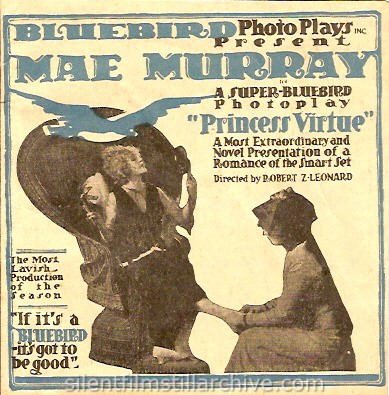
Bluebird Photoplays Inc. present MAE MURRAY in A Super-Bluebird Photoplay
"Princess
Virtue"
A Most Extraordinary and Novel Presentation of a Romance
of the Smart Set
Directed by Robert Z. Leonard
The Most Lavish Production
of the Season
If it's a BLUEBIRD - it's got to be good.
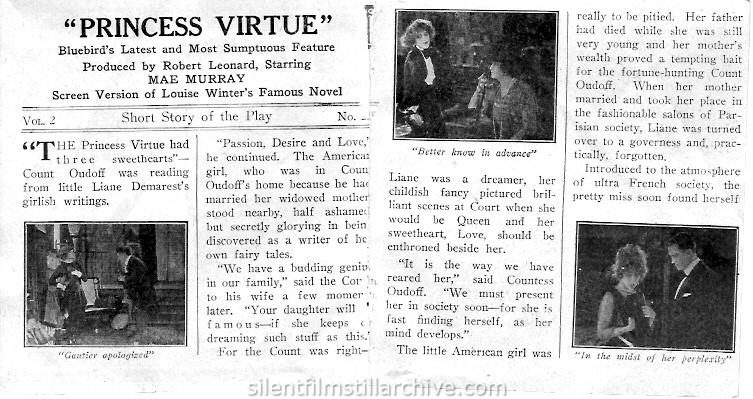
"Princess
Virtue"
Bluebird's Latest and Most Sumptuous Feature
Produced
by Robert Leonard, Starring
MAE MURRAY
Screen Version of Louise
Winter's Famous Novel
Short Story of the Play
"The Princess Virtue had three sweethearts" -- Count Oudoff was reading from little Liane Demarest's girlish writings.
"Passion, Desire and Love," he continued. The American girl, who was in Count Oudof's home because he had married her widowed mother stood nearby, half ashamed but secretly glorying in being discovered as a writer of her own fairy tales.
"We have a budding genius in our family," said the Count to his wife a few moments later. "Your daughter will be famous -- if she keeps on dreaming such stuff as this."
For the Count was right -- Liane was a dreamer, her childish fancy pictured brilliant scenes at Court when she would be Queen and her sweetheart, Love, should be enthroned beside her.
"It is the way we have reared her," said Countess Oudoff. "We must present her in society soon -- for she is fast finding hersolf, as her mind develops."
The little American girl was really to be pitied. Her father had died while she was still very young and her mother's wealth provided a tempting bait for the fortune-hunting Count Oudoff. When her mother married and took her place in the fashionable salons of Parisian society, Liane was turned over to a governess and, practically, forgotten.
Introduced to the atmosphere of ultra French society, the pretty miss soon found herself
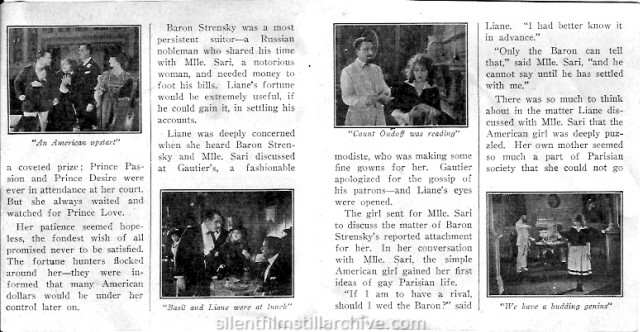
a coveted prize; Prince Passion and Prince Desire were ever in attendance at her court. But she always waited and watched for Prince Love.
Her patience seemed hopeless, the fondest wish of all promised never to be satisfied. The fortune hunters flocked around her -- they were informed that many American dollars would be under her control later on.
Baron Strensky was a most persistent suitor -- a Russian nobleman who shared his time with Mlle. Sari, a notorious woman, and needed money to foot his bills. Liane's fortune would be extremely useful, if he could gain it, in settling his accounts.
Liane was deeply concerned when she heard Baron Strensky and Mlle. Sari discussed at Gautier's, a fashionable modiste, who was making some fine gowns for her. Gautier apologized for the gossip of his patrons -- and Liane's eyes were opened.
The girl sent for Mlle. Sari to discuss the matter of Baron Strensky's reported attachment for her. In her conversation with Mlle. Sari, the simple American girl gained her first ideas of gay Parisian life.
"If I am to have a rival, should I wed the baron?", said Liane. "I had better know it in advance."
"Only the Baron can tell that," said Mlle Sari, "and he cannot say until he has settled with me."
There was so much to think about in the matter Liane discussed with Mlle. Sari that the American girl was deeply puzzled. Her own mother seemed so much a part of Parisian society that she could not go
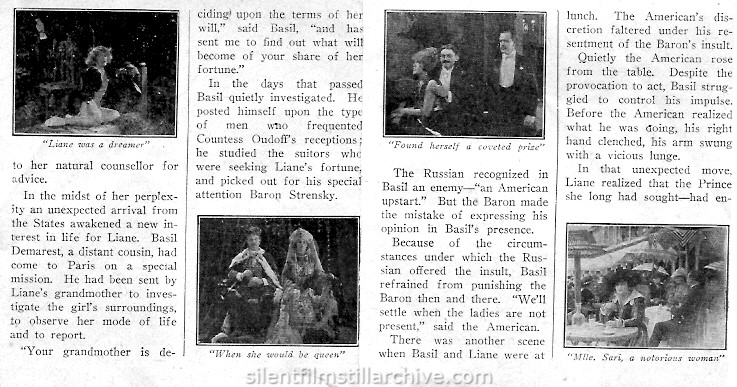
to her natural counsellor for advice.
In the midst of her perplexity an unexpected arrival from the States awakened a new interest in life for Liane. Basil Demarest, a distant cousin, had come to Paris on a special mission. He had been sent by Liane's grandmother to investigate the girl's surroundings, to observe her mode of life and to report.
"Your grandmother is deciding on upon the terms of her will," said Basik, "and has sent me to find out what will become of your share of her fortune."
In the days that passed Basil quietly investigated. He posted himself upon the type of men who frequented Countess Oudoff's receptions; he studied the suitors who were seeking Liane's fortune, and picked out for his special attention baron Strensky.
The Russian recognized in Basil an enemy -- "an American upstart." But the Baron made the mistake of expressing his opinion in Basil's presence.
Because of the circumstances under which the Russian offered the insult, Basil refraned from punishing the Baron then and there. "We'll settle when the ladies are not present," said the American.
There was another scene when Basil and Liane were at lunch. The American's discretion faltered under his resentment of the Baron's insult.
Quietly the American rose from the table. Despite the provocation to act, Basil struggled to control his impulse. Before the American realized what he was doing, his right hand clenched, his arm swung with a vicious lunge.
In that unexpected move, Liane realized that the Prince she long had sought -- had
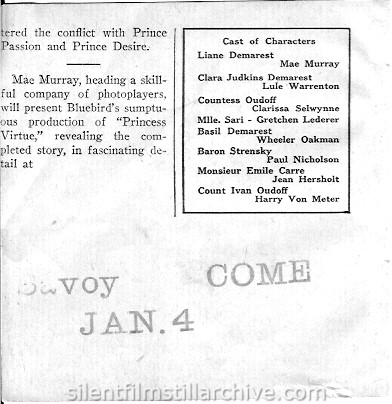
entered the conflict with Prince Passion and Prince Desire.
Mae Murray, heading a skillful company of photoplayers, will present Bluebird's sumptous production of "Princess Virtue," revealing the completed story, in fascinating detail at
SAVOY COME JAN. 4
Cast of Characters
|
Liane Demarest |
Mae Murray |
|
Clara Judkins Demarest |
Lule Warrenton |
|
Countess Oudoff |
Clarissa Selwynne |
|
Mlle. Sari |
Gretchen Lederer |
|
Basil Demarest |
Wheeler Oakman |
|
Baron Strensky |
Paul Nicholson |
|
Monsieur Emile Carre |
Jean Hersholt |
|
Count Ivan Oudoff |
Harry Von Meter |
with Mae Murray, Lule Warrenton, and Wheeler Oakman. Directed by Robert Z. Leonard. Universal/Bluebird.
More Information on this film...

This work (Princess Virtue (1917), by
Universal),
identified by
Bruce Calvert, is free of known copyright
restrictions.
Books
none
Last Modified August 17, 2012



















